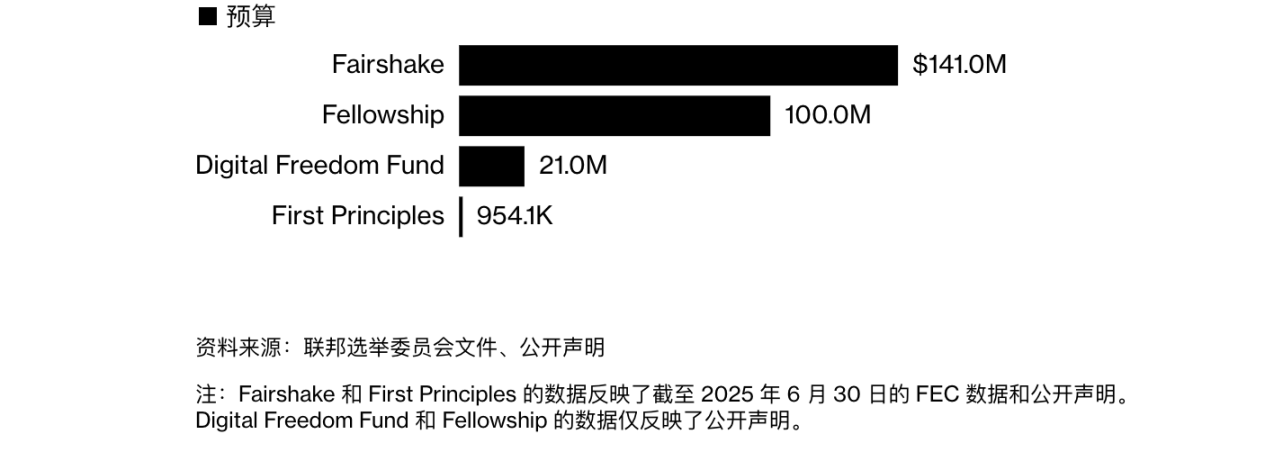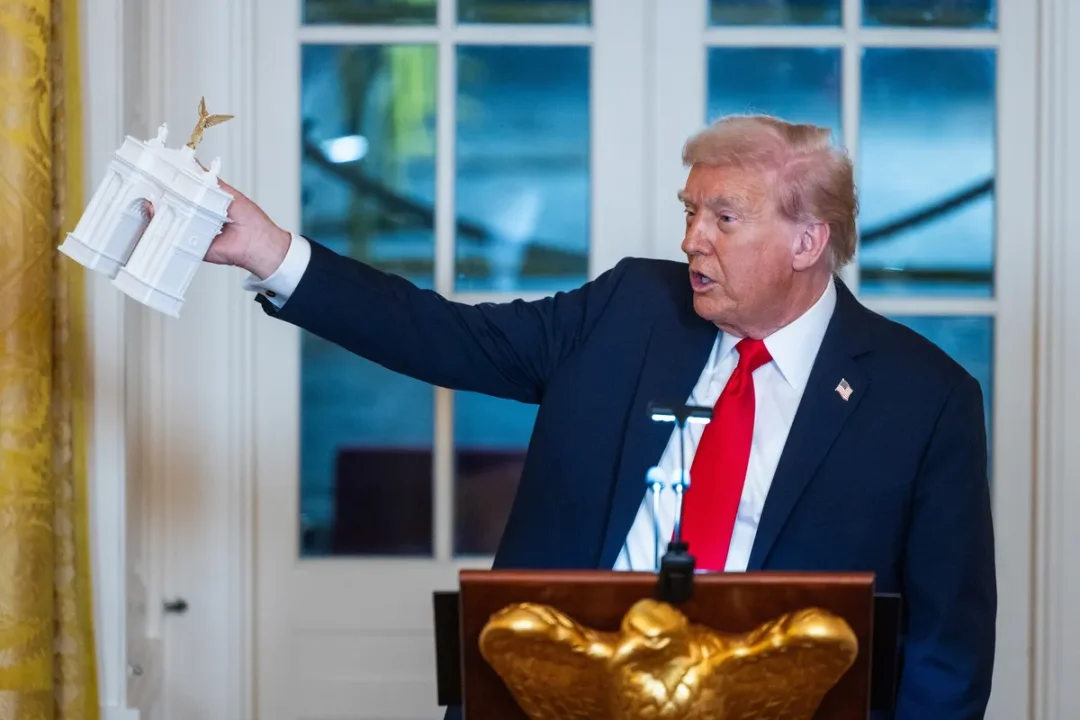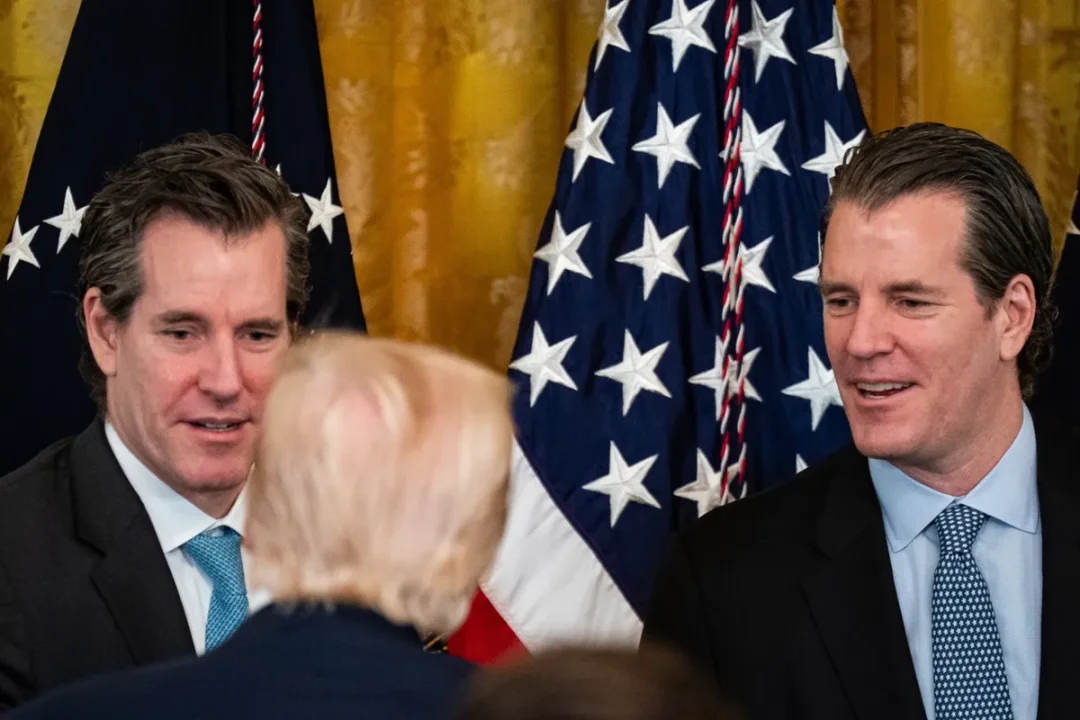$263 million political "war fund" in place, crypto industry ramps up for US midterm elections
This time, there are more super political action committees, and some have taken clearer stances in aligning with Republican candidates.
This time, there are more super political action committees, some of which have taken a more explicit stance in aligning with Republican candidates.
Written by: Annie Massa, Olga Kharif, David Pan, Bloomberg
Translated by: Luffy, Foresight News
After achieving success in the 2024 U.S. presidential election, the crypto industry is ramping up its investment for the 2026 midterm elections.
According to Federal Election Commission (FEC) filings and public statements, several crypto-focused super political action committees (SPACs) are raising about $263 million in funds. According to OpenSecrets data, this amount is nearly double the investment of the largest SPAC, Fairshake, in 2024, and slightly higher than the total spending of the entire oil and gas industry in the previous election cycle.
After the crypto industry’s massive investment in 2024, the Republican Party took control of both chambers of Congress, lawmakers passed several crypto-friendly bills, and appointed industry-friendly regulators to key positions. This influence was evident again last week: President Donald Trump pardoned Binance co-founder Changpeng Zhao, who had previously pleaded guilty to violating U.S. anti-money laundering laws and was sentenced to four months in prison during the Biden administration.
Legislative victories and the Trump family’s embrace of crypto have prompted some newly established SPACs to depart from previous strategies and more explicitly support the Republican Party, helping it consolidate control of Congress.
The crypto industry is also leveraging political donations to advance a series of legislative and regulatory priorities, with the recent core focus being the crypto market structure bill. This bill would overhaul the regulatory framework for digital assets and could grant greater authority to the more crypto-friendly Commodity Futures Trading Commission (CFTC).

SPAC midterm election budgets
To push the bill forward, about 12 top crypto industry executives traveled to Washington last week. Despite ongoing government shutdown negotiations, they held a more than hour-long meeting with a group of senior Republican senators and an even longer meeting with Democratic senators, including Minority Leader Chuck Schumer.
“The industry’s success in 2024 has built a roadmap—whether you’re a CEO or an ordinary user, it’s been proven that crypto has a voice and can influence elections,” said Cody Carbone, CEO of Washington lobbying group The Digital Chamber. “There will be more participants in the future, and more money will be invested.”
Crypto companies and executives are supporting policymakers and Trump’s initiatives in various ways. Some crypto companies have already entered into business deals with the Trump family’s crypto ventures, while others have donated to the January inauguration and the June parade. In addition, several companies are funding the new $300 million White House banquet hall. According to the White House, these include Coinbase, Ripple, and the U.S. branch of stablecoin giant Tether.

U.S. President Donald Trump displays a model of the planned Arc de Triomphe at a dinner with business executives, where the focus was on promoting the new White House banquet hall project
Besides the White House, SPACs are also a focus for members of Congress, who have the power to draft industry-related legislation.
According to public statements and FEC data, Fairshake remains the largest crypto SPAC, holding $141 million in funds as of the end of June. OpenSecrets data shows that the organization spent over $133 million in 2024 to support crypto-friendly candidates, making it one of the highest single-issue spenders in the previous election cycle. Its backers include major U.S. crypto companies such as Coinbase and Ripple, as well as venture capital firm Andreessen Horowitz.
In 2024, Fairshake and its two affiliated groups attempted to make crypto-friendly policies a bipartisan issue. For example, the organization spent about $10 million each to help Democrat Elissa Slotkin and Ruben Gallego win Senate seats in Michigan and Arizona, respectively. Both senators were among the 18 Democrats who voted in favor of the GENIUS Act, which paves the way for stablecoins favored by the crypto industry to be more widely integrated into the financial system.
But even in 2024, most of Fairshake’s election-stage funding still went to supporting Republicans, including spending $40 million to successfully defeat then-Senate Banking Committee Chairman, Ohio Democrat Sherrod Brown.

In November 2024, Senate candidate Elissa Slotkin addresses supporters at an election night event in Detroit
This time, there are more SPACs, and some have taken a more explicit stance in aligning with Republican candidates.
Last month, the crypto project World Liberty Financial, co-founded by the Trump family and presidential envoy Steve Witkoff’s family, announced it would support the Digital Freedom Fund SPAC. This PAC was founded in August by Gemini exchange co-founders Tyler Winklevoss and Cameron Winklevoss, who stated on X that they would donate $21 million in bitcoin to support Trump’s crypto agenda advocates in the primaries and midterms. According to sources, the organization plans to target Sherrod Brown, who is seeking to return to the Senate.

In July, Gemini co-founders Cameron Winklevoss (left) and Tyler Winklevoss (right) speak with President Donald Trump at the White House GENIUS Act signing ceremony
Another newly established group is the First Principles Digital PAC, which describes itself as a “Republican-led, Republican-focused organization dedicated to electing pro-crypto leaders.” Led by Republican strategist Jason Thielman and established after the 2024 election, FEC filings show it had about $954,100 in cash reserves as of the end of June. The organization has already supported Mike Rogers, who will run for a Michigan Senate seat in 2026.
Recently, Fellowship PAC announced its establishment in September and pledged to donate $100 million. Its donors have not yet been disclosed, but initial filings show its treasurer is an executive at financial firm Cantor Fitzgerald—which was previously led by Trump administration Commerce Secretary Howard Lutnick.
Representatives for Digital Freedom Fund, Fellowship, Fairshake, and First Principles Digital PAC all declined to comment.
The biggest wildcard is Tether. The stablecoin company, headquartered in El Salvador, has close ties to Cantor Fitzgerald. The New York Times reports that Fellowship PAC’s supporters are expected to include Tether, which recently established a U.S. entity.
In August this year, Tether announced it would launch a U.S.-based product and hired Trump’s former core crypto policy adviser Bo Hines to lead the effort.
Tether CEO Paolo Ardoino said in an interview last week that the company is in talks with several PACs about cooperation. Foreign companies are prohibited from donating to SPACs, but Tether’s new U.S. foothold may make it eligible to donate.

On October 2, Tether CEO Paolo Ardoino speaks at the Token2049 conference in Singapore
Faced with the crypto industry’s financial offensive, Democrats are increasingly concerned.
Eric Baulsbaugh, who worked for the campaigns of Elizabeth Warren and Hillary Clinton, serves as executive director of the newly formed group Open Frontier, which aims to align more progressive voices with the crypto industry.
“Many people in my camp are still trying to understand this industry,” Baulsbaugh said. “There isn’t a reliable spokesperson right now, and the crypto industry’s credibility has been severely damaged.”
When crypto executives visited Washington to meet with lawmakers last week, partisan divisions were evident. Chainlink Labs co-founder Sergey Nazarov, who attended the meetings, said that Republicans—including Senate Banking Committee Chairman Tim Scott of South Carolina—clearly expressed alignment with industry priorities, while Democrats raised sharp questions about crypto’s role in money laundering and decentralized finance.
“I don’t think Democrats really understand our industry yet—they’re worried about illicit finance issues,” Nazarov said.
Others point out that the industry’s huge funding and newfound political influence are forcing at least some Democrats to reconsider their positions. Even previously tough critic Brown has softened his rhetoric.
“Crypto has become part of the U.S. economy and is increasingly popular in Ohio and across the country,” Brown’s campaign manager Patrick Eisenhower said in a statement. As more people adopt digital assets, Brown wants to ensure “it can expand opportunity, improve the lives of Ohioans, and not put them at risk.”

In 2024, Senator Sherrod Brown at a Senate campaign event in Ohio
The demands of crypto industry executives go beyond the Republican hope of passing the market structure bill before the midterms; they also include adjusting crypto tax policy, anti-money laundering and sanctions-related rules, and the regulatory framework for decentralized exchanges.
Some donors are also eyeing state and local elections, such as the New York City mayoral race. Crypto entrepreneur Brock Pierce donated over $1 million to groups supporting Eric Adams just days before Adams withdrew from the race.
In Nazarov’s view at Chainlink Labs, there is a common thread in meetings with politicians. “They realize the economic value of this industry is huge, so they must clarify how to respond,” he said. “The industry will continue to grow, and they need to develop the right response.”
Disclaimer: The content of this article solely reflects the author's opinion and does not represent the platform in any capacity. This article is not intended to serve as a reference for making investment decisions.
You may also like
PEPE Price Chart Signals Oversold Zone Reversal as RSI Turns Upward

Ethena (ENA) Nears Crucial $0.54 Zone After Strong 10.5% Weekly Rebound

Solana Maintains 3-Year Support, Eyes $280 Resistance for Next Key Breakout

Dogecoin Holds Above $0.20 While zVWAP Bands Define Next Key Reaction Zone

